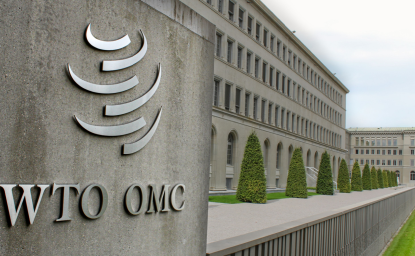Where does the WTO go from here?
The WTO’s 13th Ministerial Conference (MC13) in Abu Dhabi last February was a failure. It didn’t deliver on several agreements that were within reach, like one on fisheries subsidies. And even the few success stories, such as the extension of the moratorium on e-commerce duties, might be overturned in two years at MC14.
The meetings gave the impression that the WTO is now running just to stand still. MC13’s agenda was less about moving forward than preventing countries from backsliding on obligations.
So, what went wrong?
One explanation is that domestic politics completely upended the meetings. Over 60 countries are in the thick of elections, making it nearly impossible for them to compromise. Yet most of MC13’s negotiating items have been on the agenda for years. With only a few exceptions, like the US on digital trade and intellectual property, negotiating positions on most of these items have remained the same.
Another explanation is that India is to blame for bringing down MC13. New Delhi refused to compromise on almost anything, even when it had few allies. But India, along with South Africa, did more to wreck the meetings in 2022 than in 2024. Heading into MC12, India and South Africa proposed the misguided TRIPS waiver, which caused a North-South rift; challenged the legality of Joint Statement Initiatives in the hopes of dooming “plurilaterals;” objected to the fisheries deal in a way that signaled recalcitrance; and came out against extending the moratorium on e-commerce duties as a wedge issue between developing versus developed countries.
These proposals were meant to undermine MC12 and, left unresolved, they were bound to pose challenges at MC13.
Though these obstacles should not be discounted, much of the blame for MC13’s failure rests with the US. After decades as the world’s foremost advocate for greater ambition at the WTO, the US regrettably has joined the group of countries obstructing outcomes and working to weaken WTO rules. For instance, the Biden Administration withdrew US support for key digital trade proposals ahead of MC13, arguing that foreign governments should have “policy space” to regulate US companies as they see fit. The Administration also reversed longstanding US policy by supporting a waiver of intellectual property rights under the TRIPS Agreement for COVID vaccines. These reversals stunned US allies and sent ambition on a downward spiral at the WTO.
Indeed, the debacle in Abu Dhabi may have already doomed MC14. Analysts worry the moratorium on e-commerce duties will not be extended when the WTO next gathers in Cameroon. There’s also the potential that the sponsors of an expanded TRIPS waiver will take another kick at the can at MC14, even though WTO members recognized that “there was no consensus” on the issue ahead of MC13 after years of deliberations.
In fact, if the absence of US leadership at the WTO continues, other waivers could also be on the agenda for MC14. The WTO’s Director General, Ngozi Okonjo-Iweala, has said she would be open to discussing an intellectual property waiver on green technology. This idea got considerable traction at the UN’s COP27, where it was combined with a “peace clause” on litigation over subsidies to fight climate change.
For its part, the African Group, comprised of 44 countries, has also submitted proposals on how intellectual property waivers and high tariffs can purportedly help developing countries more quickly meet their industrial policy goals.
Buying into this waiver frenzy will not show that the WTO is relevant to solving the problems of the day. Waivers will not boost confidence in the rules-based global trading system. Rather, they’ll be taken as proof that important public policy goals can only be met by working around the rules.
The first Director General of the GATT, Eric White, is rumored to have called the institution “a collection of exceptions, strung together by loopholes.” This wasn’t meant as a compliment back then, and it’s exactly what the WTO will become if MC14 attendees buy into a waiver frenzy. The US should be working to prevent this outcome – not encourage it.
Instead of rushing to consider a waiver, MC12 should have addressed COVID as a thematic work program, like the one on small economies. These are more likely to direct attention to holistic solutions. COVID, for example, put the spotlight on tariffs on vaccine ingredients, export restrictions, and differences across regulatory approval processes for medicines. These are problems the WTO is good at solving, including by providing transparency. Inexplicably, the Biden Administration refused to join our closest allies—including Canada, the European Union and Japan—in supporting common-sense proposals to address these issues. Instead, India and South Africa got the WTO focused on one issue and one solution—a TRIPS waiver—and the US took the bait.
When governments rightly followed the evidence and refused to expand the TRIPS waiver at MC13, South Africa spun the situation as evidence of the WTO’s inability to help developing countries deal with a pandemic, even though Pretoria worked tirelessly to keep other more efficacious tools out of the conversation. Meanwhile, the US stayed silent at MC13, and disappointingly did not articulate opposition to expanding the TRIPS waiver. Instead, in a statement issued by US Trade Representative Katherine Tai regarding MC13, the Ambassador highlighted “the need for our trade policies to be flexible to allow Members to manage current global challenges.”
Along with putting more emphasis on thematic work programs, MC14 should take a lesson from MC1. The Singapore meetings had to take up big questions, including what countries wanted from the WTO. The Abu Dhabi Ministerial Declaration talks about the multilateral trading system “with the WTO at its core” without giving clues as to what this means in 2024. The US should reassert leadership at the WTO by pushing the organization to return to its core mission: reducing barriers to global trade and innovation. No country has more to lose if the WTO is allowed to turn into a collection of exceptions and loopholes.
Author

Karl F. Landegger Professor of International Business Diplomacy at the Edmund A. Walsh School of Foreign Service at Georgetown University

Wahba Institute for Strategic Competition
The Wahba Institute for Strategic Competition works to shape conversations and inspire meaningful action to strengthen technology, trade, infrastructure, and energy as part of American economic and global leadership that benefits the nation and the world. Read more

Explore More
Browse Insights & Analysis
WTO Members Prepare for Disappointment At February Ministerial Meeting

Scaled Back eCommerce Agreement Possible at February WTO Ministerial

The US Gets Intellectual Property Right at the WHO, Wrong at the WTO



